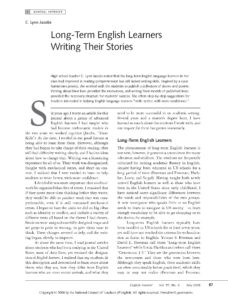Author: Lynn Jacobs
Summary: Long-term English learners—those who typically have attended school for at least seven years—speak English well but are often considered below grade level. Because they assume many adult responsibilities in their out-of-school lives, including household duties and translating for family and others, they present opportunities for teachers of writing. Secondary classroom teachers and those planning and providing professional development focused on writing for English learners will discover several effective strategies in this article. Jacobs describes the process and outcomes of working with her students to publish a book of stories and poems. The authentic nature of writing about their lives, together with models of published texts, motivated a desire to write well and boosted their confidence as writers.
Original Date of Publication: July 2008
Excerpt
The students with whom I work are predominantly non-migrant Hmong and Mexican Americans. They, like other long-term English learners, know how to blend into the dominant culture, speak English well, and in many cases have adopted the same sort of “teen-speak” as their non–English learner friends. They face conflicts between the dominant culture in which they work and go to school and the home culture of their parents. Their ability to speak English places them in adult roles at a young age, as they translate for their elders. They are often expected to work after school to help support the family, and in many cases do the cooking and housework. Many have little time left to do homework, yet they are chastised by their parents when they bring home less than outstanding grades.
Related Resources
- Love Ties My Shoes: Long-term English Learners as Thoughtful Writers
- Resources for Educators of English Language Learners: An Annotated Bibliography
Copyright © 2008 by the National Council of Teachers of English. Posted with permission.
Jacobs, C. Lynn. 2008. “Long-Term English Learners Writing Their Stories.” English Journal 97 (6): 87–91. www.ncte.org
Original Source: National Writing Project, http://www.nwp.org/cs/public/print/resource/2704
